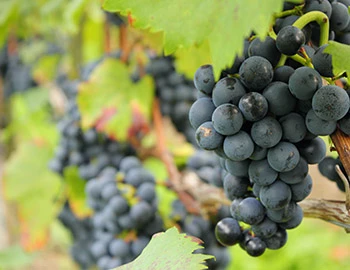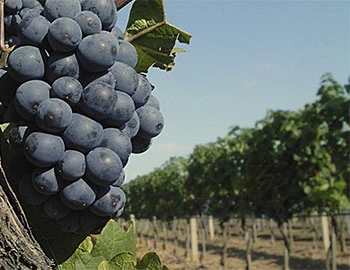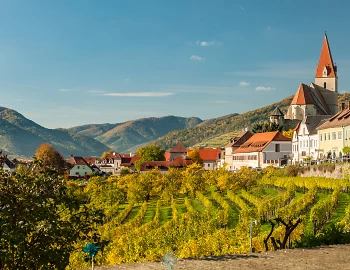Bertholdi (rot) 2019
QWt Burgenland, Gut Oggau, 750 ml

| Grape variety: | Blaufränkisch |
| Producer: | Gut Oggau |
| Origin: | Austria / Burgenland / Neusiedlersee |
| Other vintages: |
Description
The nose is complex with fruity and spicy flavours: blackcurrant and blackberry combined with delicate pepper and vanilla touches. Very concentrated on palate due to the low yields but also has a balancing freshness. Fine grain tannins with good phenolic ripeness. A long and silky finish.
Attributes
| Origin: | Austria / Burgenland / Neusiedlersee |
| Grape variety: | Blaufränkisch |
| Label: | Vegan, Certified organic or biodynamic wine |
| Ripening potential: | 3 to 8 years |
| Drinking temperature: | 16 to 18 °C |
| Food Pairing: | Roast saddle of venison, Saddle of lamb fillet with herb jus, Wild specialities, Wild boar entrecôte with Spätzli, Roasted lamb gigot, Wild fowl |
| Vinification: | fermentation with grapes' own yeast, stamped by foot, long must fermentation, partly destemmed |
| Harvest: | hand-picking, strict selection, in small boxes |
| Maturation: | in tonneau |
| Maturation duration: | 24 months |
| Volume: | 12.5 % |
| Note: | Contains sulphites |
Gut Oggau
What’s the secret of the wines of Austria's Gut Oggau?
Gut Oggau wines are among the best organic wines in Austria, and are produced by Eduard Tscheppe and his wife Stephanie Tscheppe Eselböck on the shores of Lake Neusiedl in Burgenland.
Before Eduard founded the winery, he produced conventional wine with his father in Styria, while Stephanie’s family owned and operated the Michelin-star restaurant & hotel Taubenkobel. They restored the 17th century winery, which had been abandoned for many years. When the restoration was completed in 2007 they started with nine hectares. Today, almost 15 years later, they own 15 hectares and are Demeter certified. The previous owner of the winery was a 92-year-old woman with no children. She hadn’t tended the vineyards for several years. That was an exciting challenge for the young couple. Fortunately, there had been a gap of several years between owners, so the soils had a chance to recover from the chemicals that had been used previously. It was important to Stephanie and Eduard not to change the vineyard, and instead they embraced its natural potential. From the very beginning their approach has been to work with nature and to handle the soil and the vines with great care with the focus on sustainability. They were amazed at just how much character the barrels revealed in the very first vintage; each wine seemed so alive, shining bright with its own personality – and thus the Gut Oggau family was born.

Blaufränkisch
Fanned by warm winds
The Blaufränkisch fits in comfortably in Burgenland and in neighbouring Hungary. Caressed by the warm winds of the Pannonian Plain and protected by hills and mountains, the grapes can fully ripen. They yield fine, dark-berried, well-structured red wine. Depending on taste, the vintner presses them lightly and fruitily, or gathers them in wooden casks into firm, peppery wines. They are predestined for ripeness, and pair excellently with meat and game dishes. The name of this wine is deceptive: in the middle ages, grapes from southern Germany were called “Frankisch”. They were seen as particularly sophisticated. The Blaufränkisch, however, is a native of Austro-Hungary. In Hungary, where it is called Kékfrankos, it even occupies twice as much vineyard space as in Austria. Some producers make wine on both sides of the border.

Burgenland
Burgenland: Reds, sweets and other wonders
Burgenland is often referred to in Austria as the new wine world. In fact, wines – with exceptions like the nobly sweet Ruster Ausbruch – were almost entirely unknown here 20 years ago. Today, the most substantial red wines in Austria mature here. And the sweet wine scene is also stronger than ever before. Even the whites – for instance, in the Leitha Mountains – are on the upswing. The basis for this wine wonder are the various terroirs that overlay the land in a complex patchwork.

Austria
Austria – Sumptuous culture, accessible to all
Austria is characterized by unbelievable topographical diversity. A flat steppe in the east, forests and hills in the Alpine regions, wetlands and Mediterranean landscapes in the south. This in addition to a rich tradition and even greater love. It’s no surprise that the Romans found joy on this patch of Earth and cultivated wine growing. Austrian wine is not abundant, but it is high quality.



